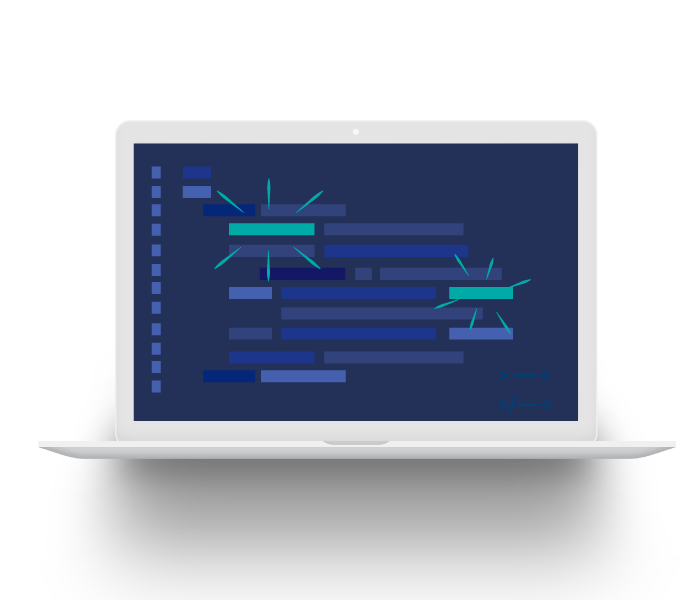Exploring AI's Role in Software Testing
The increasing integration of Artificial Intelligence (AI) into the real world of software testing is reshaping and potentially transforming how software testing is approached and executed.
From offering intelligent automation to predictive analysis, AI is helping to optimise testing projects and processes, enhance efficiency, and ultimately elevate software quality.
As well as helping to improve existing practices, AI can be a catalyst for innovation and in this blog, we will walk through the areas which we think it either could or is already having an effect.

1. Automated Test Generation
One of the challenges of manual testing is that there are occasions where it may be impractical to test every possible combination of inputs, data sets and conditions (time; budgets; resource). AI algorithms can offer an alternative method by which to analyse code, identify potential test scenarios, and generate test cases encompassing a variety of conditions and scenarios.
These algorithms have the capability to pick up on challenging edge cases and scenarios that may be hard to identify through manual testing alone - contributing to a more thorough and robust testing strategy.
2. Intelligent Bug Fixing
A proactive approach to bug fixing can have incalculable benefits for any organisation, and AI can play a crucial role in enabling this. Complex and hard to find bugs can seriously hamper a program’s ability to hit time and cost budgets / targets. However, automated bug-fixing tools such as DeepCode can propose code alterations or patches based on examining the codebase and drawing insights from historical bug data and anomalies.
This depth of examination ensures the proposed fixes address the underlying causes of bugs rather than simply treating symptoms. AI algorithms continuously learn from new data and feedback, improving their ability to identify and fix bugs over time.
As more issues are addressed comprehensively and accurately, the debugging process is evidently enhanced and expedited, and the likelihood of issues arising in future development iterations is reduced.
3. Defect Analysis & Root Cause Identification
The ability of AI to identify defect patterns and analyse test results, can be an enormous help for Testers and Developers in being able to more efficiently pinpoint the root causes of issues in the software.
By analysing historical data and test results, AI algorithms can identify recurring patterns associated with defects.
These algorithms are able to discern patterns that may be challenging for human testers to identify or recognise patterns that might be scattered across diverse data sets. This proactive identification of vulnerabilities and anomalies brings potential defects to light, allowing the development team to investigate and address these issues before they escalate.
Since AI algorithms can process a large volume of information in real-time, insights into the root causes of defects are provided promptly – accelerating the debugging and troubleshooting process and allowing for more efficient usage of resources.
4. Time & Resource Efficiency
Integrating an AI system for the creation of unit tests can markedly accelerate workflow and potentially reduce the overall development timescales. This can be crucial in agile development environments where rapid iterations and frequent releases are common goals.
Manual test creation and execution consumes a significant amount of time and are often prone to human error. Handing over or delegating tasks such as writing test cases and reviewing results to AI can help to:
- enhance resource utilisation
- allow Developers Testers to allocate more of their time towards tasks that require creativity, problem-solving and strategic thinking
- expedite the release process
- ensure consistency in test execution
- improve the reliability of the testing process
5. Optimising Collaboration & Streamlining Integration
Using AI to drive the prioritisation of test suites will ensure that critical tests are executed first, providing rapid feedback on the most crucial aspects of the codebase. This prioritisation enhances the efficiency of the testing process and allows Developers to focus on resolving critical issues early in the development cycle.
In terms of integration, Jenkins and IntelliCode are examples of tools that can analyse code changes, detect conflicts, and propose resolutions that help to speed up the integration process. Quick identification and resolution of conflicts, coupled with prioritised test suite execution, will contribute to a shortened feedback loop.
In addition, various stages of a CI pipeline can be optimised by seamlessly integrating AI components; deployment strategies become more refined, essential test suites are prioritised, and more rapid feedback is guaranteed.
6. Continuous Test Orchestration
Test orchestration is the arrangement of automated tests into a sequence for execution, to enable efficient monitoring and test execution. By incorporating AI into the orchestration, new code changes are automatically subjected to a battery of tests throughout the development lifecycle.
Potential issues are identified earlier, so Developers are provided with timely feedback and the risk of defects making their way into production is reduced.
Continuous test orchestration enhances collaboration by providing a shared understanding among Developers, Testers, and stakeholders regarding the evolving software's status and quality. AI-driven orchestration not only streamlines integration but also establishes a proactive testing environment, aligning with agile and DevOps practices for ongoing improvement and effective collaboration.
As a result, the software development lifecycle becomes a well-coordinated, feedback-driven loop that continually refines and elevates the overall quality of the software product.
Artificial Intelligence in testing has the ability to mark a pivotal shift in how testing is approached and executed. AI-driven automation tools can help to streamline testing processes, ensure increased efficiency and allow faster release cycles.
Adopting AI technologies is a commitment to continuous improvement. It can improve an organisation’s ability to navigate the challenges of software development with speed and agility – helping them to deliver high-quality products in a very dynamic landscape.
At nFocus Testing, we specialise in a range of software testing methodologies designed to ensure the highest quality and performance of your software applications. Our comprehensive suite of services includes health check review, performance testing, user acceptance testing (UAT), and functional testing, among others.







.png)
